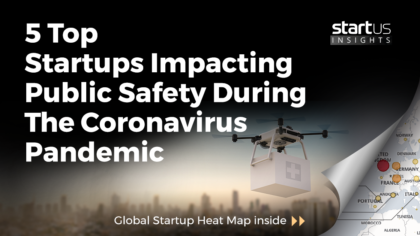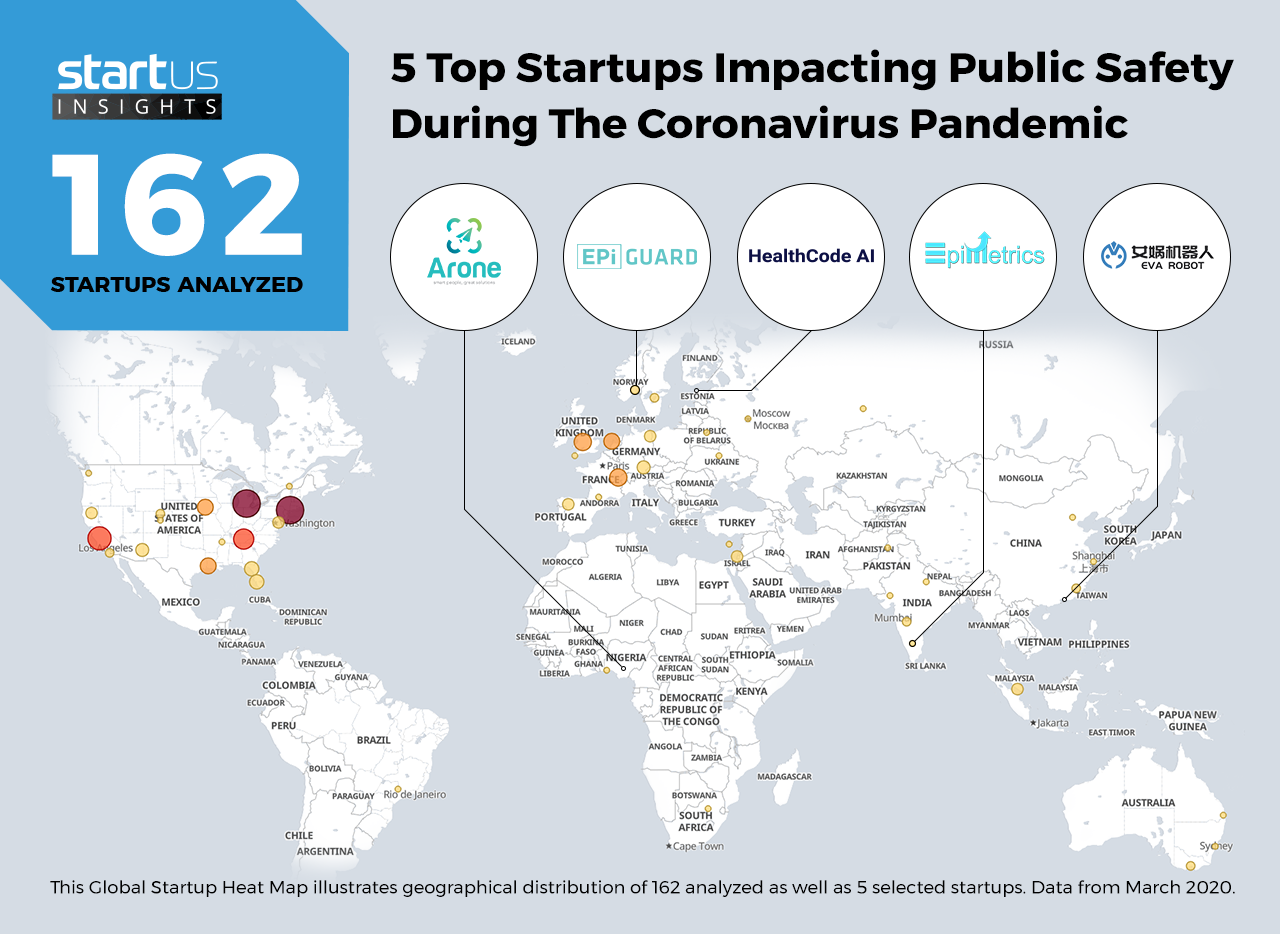Accelerate Productivity in 2025
Reignite Growth Despite the Global Slowdown
Our Innovation Analysts recently looked into emerging technologies and up-and-coming startups working on public safety solutions that ensure safety for medical and health workers and for the larger public.
Heat Map: 5 Top Startups Impacting Public Safety During A Pandemic
We use a data-driven startup scouting approach to identify the most relevant solutions globally. The Global Startup Heat Map below highlights 5 interesting examples out of 162 relevant solutions. We analyzed technology-driven solutions that ensure public safety and health for millions of people around the world. Arone, EpiGuard, HealthCode AI, Epimetrics, and EVA Robots develop 5 top solutions to watch out for.
Arone – Drone-Based Medical Supplies Delivery
Procuring and distributing vital equipment and medicines is not always an easy process, especially during the coronavirus pandemic and other extreme situations. Drones make it possible to deliver blood, vaccines, and other medical supplies where they are needed most. The supplies reach vulnerable groups faster, without human participation, and in tough weather or environmental conditions.
Nigerian startup Arone provides an eco-friendly delivery solution using autonomous drones. The startup offers aerial logistics services for clinics, hospitals, laboratories, and other medical distribution centers to provide faster delivery of vital medical products, on-demand. An autonomous flight navigation software uses computer vision and artificial intelligence for flight planning, obstacle manoeuvering and detecting when a parcel is delivered.
EpiGuard – Specialized Isolation For Infected Patients
Transporting patients with infectious diseases is challenging, especially considering the speed with which the disease spreads, as we see now with COVID-19. Without adequate isolation, the risk of transmitting viruses from patients to healthy people and medical personnel is very high. Specialized isolation units are used for the safe transportation of infected patients to the hospital, or to dedicated isolation wards, to prevent the further spread of epidemics and ensure the safety of health workers.
Norwegian startup EpiGuard develops and manufactures medical equipment for the safe transport of contagious patients. EpiShuttle is a medical isolation and transportation system intended for use, in both high-risk scenarios, and in every-day practice, when dealing with resistant diseases or other contagious viruses that require maximum attention. Once the patient is loaded in the EpiShuttle, medical staff do not have to wear full Personal Protective Equipment (PPE) during transport. The EpiShuttle is CE-marked as a Class 1 Medical Device.
HealthCode AI – Support Applications For Health Workers During Epidemics
Healthcare workers are under huge pressure, struggling with the COVID-19 pandemic all over the world. Different communication platforms and other healthcare information tools provide quick data exchange and care collaboration among medical teams and patients. Those solutions combine communication channels, electronic health records (EHR) with clinical decision support systems, and other useful tools. This helps healthcare professionals stay informed, coordinate collaboration, and have all necessary information on their fingertips.
Estonian startup HealthCode AI provides physicians with support in daily patient management by using an Artificial Intelligence (AI) diagnostic platform to pre-evaluate patients. The startup develops an AI Physician – Leia, who is capable of interacting with patients and visualizing disease information for physicians.
EpiMetrics – Virus Outbreak Predictions & Visualization
The novel coronavirus, originating from Wuhan, has triggered a global public health emergency. Big data and artificial intelligence play an important role in trying to slow the spread of this virus: from early detection, containment, and isolation, to mitigation and segmentation, and to vaccines and treatments for the virus. Advancements in Geographic Information Systems (GIS) tools allow the spread of COVID-19 to be modeled through various spatial and temporal scales. Such visual representations provide easy to digest information, vital for the public in remaining calm during an epidemic outbreak.
Indian company EpiMetrics offers an analytics-based system that detects impending epidemic outbreaks in real-time. Their system detects the fast-spreading diseases in a particular location and creates a map to illustrate the magnitude and extent of the spread. EpiMetrics’ data visualization dashboard enables users to monitor disease outbreaks with great clarity and accuracy. This helps avoid unnecessary risks while deploying aid and other medical assistance to infected clusters.
EVA Robot – Robots For Patrolling & Disinfecting
The shortage of essential personnel, such as healthcare professionals and police, is one of the biggest challenges when it comes to implementing quarantine and other preventive measures. Robotics and automation solutions increase the overall productivity of pending tasks and function in an unaffected and uninterrupted manner during a pandemic. Robots are used for patrolling and monitoring the streets and those showing the symptoms of COVID-19. Further, special disinfection robots replace humans in cleaning streets and other disinfection operations.
Chinese startup EVA Robot provides an autonomous pavement-cleaning robot. Following a pre-set route, they automatically, efficiently, and accurately spray, disinfect, and clean the targeted space. As the novel coronavirus is sensitive to ultraviolet light and heat, the driverless vehicles are equipped with an ultraviolet (UV) disinfector, ensuring comprehensive disinfection of 150 square meters every hour per robot.
How To Flatten The Curve?
This is an unprecedented situation for many of us across the world. The SARS outbreak in the early 2000s claimed 774 lives. That toll was enough to drive research & development and easier healthcare solutions. The fact that several mobile health, e-health, diagnostics, and remote health startups and companies are able to respond during a real epidemic is encouraging. With thousands of deaths already, we expect to see numerous new companies offering technology-driven solutions to help doctors, nurses, other health workers, and the larger public.








